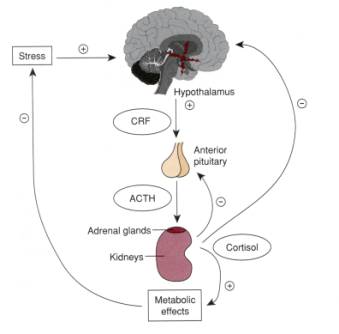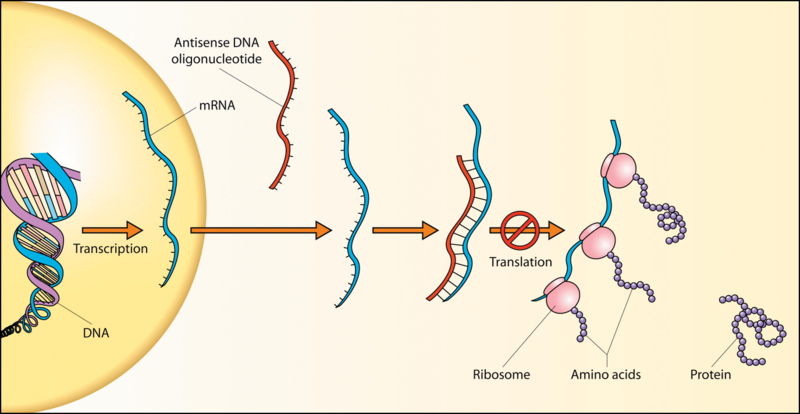
Pharmacological
treatment in neonatal life may have enduring effects, reducing the
alterations in hormonal homeostatic programming mechanisms induced
by early repeated handling. Several investigations suggest that the
role of early environment in influencing development mainly involves
the hypothalamic-pituitary-adrenal axis. Therefore, we are examining
whether 1) daily neonatal handling,  applied from birth to weaning
induces HPA hormones alterations in mice lasting up to the adult
age; and 2) if the administration of an antisense
oligodeoxynucleotide versus pro-opiomelanocortin (As-POMC) prevents
hormonal alterations observed in previously handled mice (Handled).
In the adult phase (90 days), Handled are overweight and have higher
basal plasma immuno-reactive (ir)-corticosterone and
adrenocorticotropin (ir-ACTH), and higher pituitary ir-ACTH; while
they have lower hypothalamic ir-ACTH and corticotropin-releasing
hormone (ir-CRH) in comparison with the non-handled mice. As-POMC
(0.05-0.1 nmol/g body weight per day) administered during the same
period dose-dependently prevents the increase in body weight, in
plasma ir-corticosterone, ir-ACTH, and pituitary ir-ACTH, also
preventing the decrease in hypothalamic ir-CRH and ir-ACTH; while
the mismatch oligonucleotide is nearly inactive. applied from birth to weaning
induces HPA hormones alterations in mice lasting up to the adult
age; and 2) if the administration of an antisense
oligodeoxynucleotide versus pro-opiomelanocortin (As-POMC) prevents
hormonal alterations observed in previously handled mice (Handled).
In the adult phase (90 days), Handled are overweight and have higher
basal plasma immuno-reactive (ir)-corticosterone and
adrenocorticotropin (ir-ACTH), and higher pituitary ir-ACTH; while
they have lower hypothalamic ir-ACTH and corticotropin-releasing
hormone (ir-CRH) in comparison with the non-handled mice. As-POMC
(0.05-0.1 nmol/g body weight per day) administered during the same
period dose-dependently prevents the increase in body weight, in
plasma ir-corticosterone, ir-ACTH, and pituitary ir-ACTH, also
preventing the decrease in hypothalamic ir-CRH and ir-ACTH; while
the mismatch oligonucleotide is nearly inactive. 
|
 applied from birth to weaning
induces HPA hormones alterations in mice lasting up to the adult
age; and 2) if the administration of an antisense
oligodeoxynucleotide versus pro-opiomelanocortin (As-POMC) prevents
hormonal alterations observed in previously handled mice (Handled).
In the adult phase (90 days), Handled are overweight and have higher
basal plasma immuno-reactive (ir)-corticosterone and
adrenocorticotropin (ir-ACTH), and higher pituitary ir-ACTH; while
they have lower hypothalamic ir-ACTH and corticotropin-releasing
hormone (ir-CRH) in comparison with the non-handled mice. As-POMC
(0.05-0.1 nmol/g body weight per day) administered during the same
period dose-dependently prevents the increase in body weight, in
plasma ir-corticosterone, ir-ACTH, and pituitary ir-ACTH, also
preventing the decrease in hypothalamic ir-CRH and ir-ACTH; while
the mismatch oligonucleotide is nearly inactive.
applied from birth to weaning
induces HPA hormones alterations in mice lasting up to the adult
age; and 2) if the administration of an antisense
oligodeoxynucleotide versus pro-opiomelanocortin (As-POMC) prevents
hormonal alterations observed in previously handled mice (Handled).
In the adult phase (90 days), Handled are overweight and have higher
basal plasma immuno-reactive (ir)-corticosterone and
adrenocorticotropin (ir-ACTH), and higher pituitary ir-ACTH; while
they have lower hypothalamic ir-ACTH and corticotropin-releasing
hormone (ir-CRH) in comparison with the non-handled mice. As-POMC
(0.05-0.1 nmol/g body weight per day) administered during the same
period dose-dependently prevents the increase in body weight, in
plasma ir-corticosterone, ir-ACTH, and pituitary ir-ACTH, also
preventing the decrease in hypothalamic ir-CRH and ir-ACTH; while
the mismatch oligonucleotide is nearly inactive.